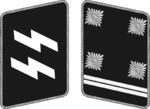Obersturmbannführer facts for kids
Quick facts for kids Obersturmbannführer |
|
|---|---|
| Country | |
| Service branch | |
| Abbreviation | Ostubaf |
| NATO rank | OF-4 |
| Formation | 1933 |
| Abolished | 1945 |
| Next higher rank | Standartenführer |
| Next lower rank | Sturmbannführer |
| Equivalent ranks | Oberstleutnant |
Obersturmbannführer (pronounced: Oh-ber-sturm-bahn-fyoo-rer) was a special rank used by groups connected to the Nazi Party in Germany. These groups were called the SA (Sturmabteilung) and the SS (Schutzstaffel). The rank was created in 1933.
The Obersturmbannführer rank was lower than Standartenführer. It was similar to a lieutenant colonel in the German Army. The short way to say Obersturmbannführer was Ostubaf.
What the Rank Looked Like
The Obersturmbannführer rank was shown on the uniform. It had four silver pips (small dots) and a black stripe. These were placed on a silver background. You would see these on the left side of the collar on an SS or SA uniform.
This rank was also worn on the shoulder boards, like a lieutenant colonel. It was the highest rank in the SS and SA that could also show special unit symbols on the collar. These symbols were on the collar wing opposite the rank.
Some special units of the Waffen-SS were made up of people from other countries. These units were different from the main German SS. Because of this, they did not wear the SS symbols on their collars. Instead, they wore their own unit symbols. Their ranks also started with "Waffen" instead of "SS". For example, it would be "Waffen-Obersturmbannführer".
Adolf Eichmann and His Rank
In 1940, a man named Adolf Eichmann was promoted to Obersturmbannführer. He was listed with this rank at an important meeting in January 1942 called the Wannsee Conference.
Years later, in 1961, Eichmann was on trial for his terrible actions during the war. The main lawyer, Gideon Hausner, pointed out how important the Obersturmbannführer rank was. He did this because Eichmann claimed he was just a "clerk" following orders. Hausner asked him, "Were you an Obersturmbannführer or an office girl?" This question showed that the rank meant he had real power and responsibility.
A writer named Hannah Arendt wrote a book about Eichmann in 1963. She said that Obersturmbannführer was not a very high rank. She mentioned that Eichmann hoped to be promoted to Standartenführer. She also said that people like Eichmann, who started from lower ranks, usually couldn't go higher than a lieutenant colonel (Obersturmbannführer) unless they were fighting on the front lines.
Rank Insignia
| Obersturmbannführer SS, SA, NSKK, and NSFK | ||||||
|
Schutzstaffel (SS) |
Sturmabteilung (SA) |
NS Motor Corps (NSKK) |
NS Flyers Corps (NSFK) |
||
|---|---|---|---|---|---|---|
 |
 |
 |
 |
 |
||
| Waffen-SS |
|
collar insignia | ||||
| Junior Rank Sturmbannführer |
SS rank and SA rank Obersturmbannführer |
Senior Rank Standartenführer |
See also
- Table of ranks and insignia of the Waffen-SS
 | Madam C. J. Walker |
 | Janet Emerson Bashen |
 | Annie Turnbo Malone |
 | Maggie L. Walker |


